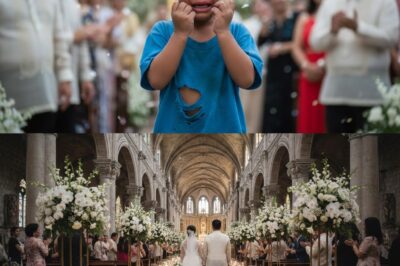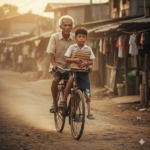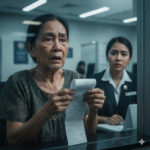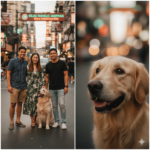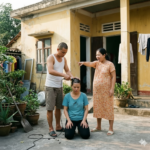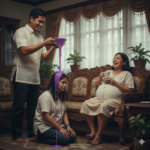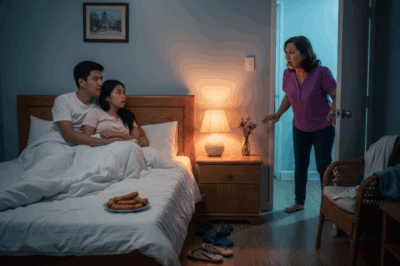
That night, everyone had already left. The restaurant yard was mottled with the last streaks of late-season rain, and a few scattered rose petals clung to the steps like torn scraps of red paper. I rested my head on Hoang’s shoulder on the new bed, my white veil draped over a chair like a lost little cloud. The air smelled of fresh soap and jasmine tucked into the pillowcases. A soft yellow nightlight glowed. Outside, a few leftover crackles of electronic firecrackers popped in the alley, like kernels of corn exploding late.
I had just laid my hand on my husband’s chest when the door burst open.
Hoang’s sister—Mai—stormed in. The cold corridor light slashed across the room like a blade. She was panting, eyes blazing like a runner reaching the finish line, and uttered a single sentence, each word dropping heavily onto the tiled floor:
“Don’t turn off the light. Let me see your right shoulder… to check if there’s a birthmark shaped like a fan.”
That line pierced the night like a nail. I froze, the satin blanket sliding off my calves, leaving me shivering. Hoang shot up: “Are you crazy, sister?” But she had already stepped back, her hands still wet from the rain, leaving behind the damp smell of wind and the squeak of plastic slippers on the floor.
Our wedding night was ripped apart, like someone tearing a sheet of fresh paper in two.
I met Hoang when I was already past 32—an age when my high school friends already had children the size of cassava roots, some running bakeries with their parents’ help, others cradling their second babies. Meanwhile, I spent my Saturday afternoons hugging a cold coffee, staring at my reflection in shop windows. My mother, back then, told me not to be picky anymore: “As long as he’s kind and cares for you.” She said it while glancing at my father’s photo on the cabinet, as if borrowing strength from him.
Hoang truly was kind. It showed in the calluses on his air-conditioning repairman’s fingers, in his short but never curt replies, in the way he pulled out a stool for me at a noodle stall. He wasn’t a man of sweet words, but he was steady. Each evening, he would drop by, fixing the flickering outlet, replacing a stubborn switch, climbing to the roof to check the water tank that croaked like an old frog. I once joked: “If I marry you, I’ll never fear blackouts again.” He chuckled: “If the lights go out, we’ll just sleep.”
When I met his family, everyone welcomed me. His mother, Aunt Lien, frail as a reed, tried to pick the best morsels for me with her trembling chopsticks. His father was quiet but gentle-eyed, like a tiny fish in a claypot stew. Only Mai looked at me strangely—polite, smiling just enough, but I sometimes caught her staring at the faint freckle on my right cheek, as if scrutinizing me. I brushed it off. I had no energy to decode every look from in-laws-to-be. I thought: people love me, I’ll love them back. The rest, life will adjust.
The wedding went smoothly. Friends cheered, neighbors congratulated. Mai even gifted me a gold necklace before the ancestral altar, her gaze softened: “We don’t have much, I hope you won’t mind.” I nodded, ignoring the prickling unease. That night, everything seemed settled—until she flung open the door and threw those words at me like a kitchen knife.
“Shoulder… birthmark… fan…”
Those last words kept me awake for a whole month.
Some sentences are short but strike like a verdict. That night, I couldn’t turn off the light. I told Hoang, “Let’s just sleep,” but my eyes stayed wide, counting the cracks on the ceiling. I put on a jacket, looked in the mirror. On my right shoulder was indeed a birthmark—half the size of a coin, light brown, with edges like a dried leaf.
My mother used to call it a lucky sign. I was weak as a newborn, feverish for three days until my grandmother took me to the village temple for a talisman—called the “fan charm”—to place under my pillow. I grew up with such stories; the birthmark became a natural ornament, never once a cause for fear.
The next day, I called my mother. After I told her everything, she was silent. I asked bluntly: “Mom, whose child am I?” She gave a bitter laugh: “Everyone is their mother’s child.” “Don’t say it like that,” I insisted. She sighed: “You are my child.” Then she hung up, as firmly as someone sealing a rice jar—final, but leaving me hungry.
The days that followed, I lived like a tightrope walker. I avoided Hoang so carefully that outsiders might have thought we were still virgins. He grew upset but didn’t lash out. “Are you haunted by her words?” he asked. I nodded. “She often makes things up,” he said. “Once she told our parents I raced her bike, when I didn’t even know how to ride. She has this…” He trailed off. I knew he loved her—the kind of love shaped by shared poverty, dim study lamps, thin meals after their father lost his job. That love demanded my caution.
But her words kept eating away at me.
One afternoon, I went to my in-laws’ house to fetch something. Only Mai was there, arranging white chrysanthemums in a vase. “I came for the cloak Mother was sewing for me,” she said first, taking control. I nodded. She looked at my shoulder. I instinctively tugged my strap to cover the birthmark. She pressed her lips together, set down the flower.
“That night, I spoke rashly,” she began. “But I had to. Because…” Her eyes lifted, uncertain between hardness and softness. “When I was little, I overheard our parents. They once talked about a woman—before Mother—who lost her child at the market. Father carried a little girl with a broken tooth to find her. I only remember one line: ‘The girl has a fan-shaped birthmark on her shoulder, like a talisman.’ Later, they separated. But Father kept a photo.”
She brought out a faded picture. A young man—Hoang’s father—stood beside a woman holding a frail little girl. Their eyes connected like a hidden needle threading through fabric—small, but binding. The girl in the photo tilted her shoulder, and yes, there was a faint mark.
“I may dramatize things,” Mai rasped. “But some things aren’t inventions. I just don’t want my family tainted… if that bond wasn’t really cut.” Her eyes, swollen red, lifted. “I fear betraying Mother most.”
My chest tightened. “But Hoang—what if…?” My tongue dried, the room spun like a spider’s web.
“I never said Hoang is—calm down,” she cut me short. “I only spoke of the birthmark.” But the way she stressed “only” made it twice as heavy.
That night, I sat upright to sleep. For weeks, I couldn’t lie down.
At last, I went to my mother with the photo. The shock on her face when she saw it made me blurt: “Is this you?” She trembled, spilling tea as her hand shook. I held her hand: “I need the truth. If there’s a forbidden tie, I must know.”
After a long silence, she sighed, voice rough:
“That day… I met that man at the market, just as in the photo. He carried you, asked if I had eaten, bought us noodles. He was kind. But I was only passing through his life. I kept the photo as a piece of sky. I named you Ha—summer—the season I met him. But you’re not his daughter. You are the child of another man, another broken story. I’m sorry.”
I didn’t know whether to laugh or cry. A layer of confusion peeled away, raw and stinging. “And the birthmark?” “I don’t know. You were born with it.” She pressed her hand on my shoulder, as if to erase fate. “Don’t let a patch of color decide your life.”
Her words soothed me like a damp cloth on a burn, but I needed more. I told Hoang: “Let’s do a DNA test.” He looked relieved, like being freed from an invisible cage. “Yes,” he agreed, squeezing my hand.
Mai objected when she found out. “You’ll destroy this family.” “No,” I said. “I’ll save it.”
The results came: “No direct blood relation between Subject A and B.” Black letters that flung open a door. Hoang hugged me in the clinic hallway. I wept soundlessly, like vapor moistening everything. Mai sat down, covering her face. I thought she was angry, but when she looked up, she seemed lighter, like a kite freed from tangled strings.
“I’m sorry,” she said. “I shouldn’t have spoken like that on your wedding night.”
“When should you have said it, then?” I asked. She gave a tired smile: “There’s rarely a right time in life. When I saw your birthmark during the ancestral ceremony, my heart dropped. I’ve lived years with a story I couldn’t name. I was terrified.”
We thought it was over. But life rarely stops halfway.
One evening, my mother-in-law called me over. She shut the door, opened an old chest, and handed me a yellowed letter with an old household registry. It was from my father-in-law, written to “Lien” (my mother-in-law):
“I know this will hurt you. Mai is your daughter and mine… from before you married Huu. He accepted everything, because his love is vast. I’m leaving. Don’t search for me. Keep the child, name her Mai—for a green season. Never let her feel she’s an outsider. If anyone asks, say Huu is her father. He deserves that place more than I do.”
My blood roared in my ears as I read. My mother-in-law nodded, tears falling. “Only three adults knew: your father, me, and him. We never told Mai. We feared she’d suffer. Who knew… her love for her brother would twist this way. As for Hoang—he is Huu’s real son. This house has no secrets but Mai… she’s the sweet fruit of a stormy day.”
I sat frozen. Suddenly, the smell of rain rose from the old tiles—chill and warm at once. I understood why, at our first meeting, Mai’s gaze lingered on my cheek, as though searching for a sign. Why she placed white chrysanthemums—flowers of grief and solace—into the vase. The birthmark was only the needle that unraveled a long thread, at the end of which fluttered a kite named after a woman and her hidden past.
I asked: “Does Mai know?” Mother-in-law shook her head. “She knows something—but not all.” She sighed: “Confession can lighten or burden. Silence can weigh heavy yet feel lighter. I don’t know which choice is right.”
That night, I told Hoang everything. He held me, stunned, as though embracing a bridge he had just discovered had an unseen extra span. We agreed not to tell Mai yet.
But while washing dishes, I heard footsteps at the door. Mai stood there, eyes swollen, clutching the round glass vase.
“Sister… may I leave my water jug here for a while,” she said pointlessly. I invited her in. The moment she sat down, she burst into tears.
“I was wrong. I was terribly wrong. I dragged you into a delusion I’ve carried since childhood. Today I dropped by to see Mother, and I happened to overhear her on the phone… I know now.”
Her voice broke:
“I’m not Father’s biological daughter. I… am the child of that man. The one you may have seen somewhere, in a photograph. I’m afraid. Afraid of being left behind, afraid of being an outsider. That’s why I tried so hard to prove I was the gatekeeper, the protector of this family. I overdid it.”
I stepped forward and embraced her. For the first time, I held that woman of my own accord. Her shoulders were thin and rigid, like bamboo strips left too long in the sun.
“You are not an outsider,” I whispered. “Outsiders don’t cry until their eyes are swollen for the family. Outsiders don’t barge into my wedding night with a terrible, half-finished sentence… when really it was only fear.”
I pulled her collar gently aside, searching her right shoulder. No, she had no birthmark. I took her hand and pressed it against my own.
“If you want to see, then here it is.”
She laughed through her tears: “Good heavens… you trust me enough to show me now?”
I smiled. “If that night you had said, ‘I love you,’ I’d probably have lost sleep even longer.”
We sat together among the clean dishes, listening to the faucet drip into the basin. I poured her a cup of tea.
She said softly:
“Tomorrow I’m arranging flowers at church. There’s a corner for people who want to light incense for those they can’t call by their true name. I want to light one for my father—the man I only know through a letter. And if you don’t mind, I want to light another stick for my fear, so it can rise as smoke and leave me.”
I nodded.
They say that when one knot is loosened, the rope around it also slackens. I stopped losing sleep. At night I would lie on my side, resting on Hoàng’s arm, feeling his heartbeat steady and sure, like a train passing through a field. We laughed over silly things, like newlyweds in truth. He built me a wooden kitchen shelf, saying, “So the fish sauce bottle can lean without dripping on the floor.” I teased, “If you could give birth, even the shelf would produce milk.”
Sometimes Mai visited, bringing sweet chè bà ba. I always finished it, joking, “I’ll save sweetness for the things that used to be bitter.”
One day, cleaning out old trunks with my mother-in-law, we found a small cloth pouch at the bottom—soft with age, like deep sleep—holding several photo bundles. In one faded picture taken at the village temple gate, a young woman cradled a baby girl. Not me, not Mai. But strangely, the child bore a clear fan-shaped birthmark.
Mother-in-law stared at it a long time before saying:
“Maybe another child who crossed your father’s life. Maybe another story. Life has more tangled threads than we think.”
I enlarged the photo, framed it, and hung it on the sunlit wall.
Hoàng asked, “Why hang a stranger in our house?”
I replied, “Strange yet familiar. It reminds me life is a chain that stitches what we don’t know to what we do, with invisible threads called kindness.”
One afternoon my cousin called me, crying:
“Sister, people are saying Mai isn’t truly Father’s child. Did you know?”
I sighed: “Yes, I know. Don’t let that be a reason for pointing fingers. Tell whoever’s saying it: one calls someone ‘Father’ not only because of DNA.”
I hung up, a little sad but mostly calm. Gossip is like waves brushing the shore—they’ll always leave behind a shining shell. You only need to pick the ones worth keeping.
I thought the story might close neatly with a bow. But life doesn’t like bows. It likes to… hang a bell.
One evening Mai announced:
“I met the man from the photo.”
I thought she was joking. But she explained: while arranging flowers at church, an old man stopped, gazed at her chrysanthemums, and asked, “Who taught you to leave space between stems, to let the light in?”
She laughed, “No one. I guessed.”
He wore a white shirt frayed at the collar, thick glasses, and a face carrying both sorrow and joy, like a man holding too many secrets. He murmured:
“Long ago I knew a woman who loved arranging chrysanthemums like that. She always left a tender stem aside, saying it was for tomorrow’s bloom.”
Mai asked his name. It was an ordinary name—but when she told it to Mother-in-law, the woman collapsed into a chair, clutching her chest.
It turned out, the “passing man” from Mother-in-law’s past—and Mai’s biological father—was still alive, living just three streets away from the church. He had never married, had spent decades alone teaching literature, writing small articles, caring for a starfruit tree and a cat.
He said:
“Back then I was weak. I chose to leave rather than stay and break things. I thought stepping back would keep everything peaceful. But even retreat leaves a scar.”
He looked at me for a long time, then at Mai for longer.
“I don’t want to reclaim anything. I just… want to ask permission to hang a photo in my house.”
He held out the old temple-gate photo—the one I had enlarged and framed.
“Keep a corner for me.”
We brought him home, drank tea, talked of everything and nothing. His smile was no longer bitter, only salted with life.
Before leaving, he noticed the birthmark on my shoulder—my wide-neck shirt exposed it—and chuckled:
“When I was young, I wrote a story with a character named Fan Leaf. She laughed, said the name sounded like a summer dish.”
He didn’t ask if I was the child in the photo. He asked nothing at all. And I understood—sometimes people come together not to mend broken threads, but to tie a small bow on each end, so they stay still.
That night, I slept deeply, dreamless.
A year later, with my belly round and full, I finally dared revisit my wedding night. The four of us—Hoàng, Mai, Mother-in-law, and I—sat on the porch under a sky crisp with autumn.
I teased: “Sister, tell me again. That night when you barged in, besides asking about my birthmark, what else did you want to say?”
Her cheeks flushed: “I wanted to say, ‘I’m sorry.’”
I burst out laughing, clutching my stomach until tears rolled.
“If that’s your way of apologizing, then I’ll forgive you forever.”
Mother-in-law patted my back:
“Careful, or Hoa will kick inside.”
I stroked my belly, whispering to the baby:
“Daughter, when you grow up, never barge into anyone’s room at night with half a sentence.”
The whole family laughed.
Mai placed her hand on my stomach, her eyes glowing with a freshness I’d never seen in her—the gaze of someone who had finally set a vase of flowers in its right place.
“Let me choose her middle name,” she asked.
“You and her father pick the first name, but I want her middle name to be Leaf.”
Hoàng grimaced: “That sounds like a summer snack.”
We looked at each other and laughed until our jaws ached.
That evening, I hung a new cloth pouch in the kitchen. Inside I placed a dried chrysanthemum, a fan-shaped leaf pressed in white paper, and a note that read:
“In life, some birthmarks are for recognizing one another—not doubting each other.”
The month I gave birth, rain fell as it had on my wedding night. The hospital was crowded, corridors filled with tender calls:
“Mother, please calm down.”
“Brother, did you hear what the doctor said?”
“Baby, hang in there…”
Hoàng rushed about like a shuttle. Mai stayed by me, rubbing my back, telling old stories—about losing her front teeth as a child, about sneaking to the riverbank just to hear the water, about burning incense for her fear.
I only half-listened, but her voice was a lullaby.
The baby was born, wrapped in the blanket I had sewn, its corner embroidered with a fan leaf in green thread.
I named her An.
Not Hạ, not Mai, not Leaf—An, meaning peace. I wanted her sky to carry peace from her very first glance at life.
The old man from church came with a basket of starfruit.
“These aren’t starfruit of repayment,” he joked.
Mother-in-law smiled: “In this house, debts of gratitude ended long ago.”
We said nothing more, but somehow all the words—sorry, thank you, forgiveness—had already been spoken in another way.
That night, while everyone slept, I carried An around the house. The yellow lamp hung low like a ripe fruit, a soft breeze teasing the smell of new milk.
As I laid her down, ready to turn off the light, I suddenly remembered the first sentence of this story:
“Don’t turn off the light.”
I chuckled quietly in the golden dark. Yes, don’t turn off the light. Even through stormy nights, through birthmarks and clumsy words like needles to the flesh—still, we must keep a small flame, so when needed, we look at each other and know we are not lost.
I touched my right shoulder. The birthmark remained—faint brown, fan-shaped. I no longer hated it. I saw it as a button fastening the shirt of time, keeping the past from unraveling.
I kissed it lightly, as though kissing the hand that had steadied me over a steep slope.
Later, whenever people asked about our marriage, I only told half the story: that I married late, that on my wedding night someone barged in and said something that kept me awake for months. Then I would stop, sip water, and smile:
“But that person is now the one who rocks my baby most when she cries.”
Everyone laughed, thinking I was joking. But I knew—it was the most unexpected ending of all: the one who once robbed my sleep became the one who guards it.
And among the flower arrangements Mai makes, there is always a small gap—for the light to slip in.
I hung a tiny bell in that gap. Each time the wind blew, it chimed softly, reminding me:
“Don’t turn off the light.”
News
Namatay ang kuya kong may sakit sa pag-iisip — alam kong may naglason sa kanya…/TH
Ako si Andrea. Tanda ko pa noong 8 years old pa lang ako. Si Kuya Joel ay may sakit sa…
IKAKASAL NA KAMI BUKAS PERO BIGLA SIYANG NAWALA NA PARANG BULA/th
Ako si Joy. Bukas na sana ang kasal namin ni Marco. Nakaayos na ang lahat, ang simbahan, ang gown ko,…
SAKIM NA MANAGER, PINALUHOD SA MAPANGHING BANYO ANG ‘PROBINSYANANG’ INTERN… HINDI NIYA ALAM, ITO PALA ANG TAGAPAGMANA NG BUONG KOMPANYA!/th
Masangsang. Nakakasulasok. Ang amoy ng zonrox at lumang ihi ay kumapit na sa ilong ni Ana. Nakaluhod siya sa malamig…
“KAYA KO ITONG AYUSIN” — TUMAWA ANG MILYONARYO… PERO GINAWA NG BATA ANG HINDI INAASAHAN/th
Mausok. Maingay. Nakasusulasok ang init sa gitna ng Avenida Paulista. Sa gitna ng dagat ng mga bumubusinang sasakyan, nakatigil ang…
PINAGTAWANAN DAHIL NAKASAKAY SA KALABAW, PERO NANG MAGPAKILALA ANG BINATA, LUMUHOD ANG PAMILYA NG NOBYA NIYA SA GULAT!/th
Tumahimik ang buong bulwagan nang basagin ng malakas na halakhak ni Donya Cecilia ang katahimikan. “Isang magsasaka? At hindi lang…
“Nanay, huwag mo akong iwan… isama mo ako, please…”/th
Nakatayo ako sa harap ng salamin, nakatingin sa babaeng nakasuot ng marangyang bestida ng nobya—ngunit pakiramdam ko’y isa siyang ganap…
End of content
No more pages to load






